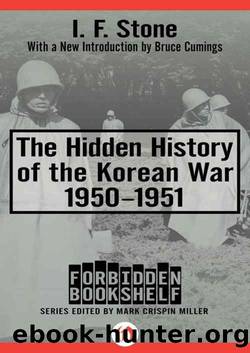The Hidden History of the Korean War: 1950â1951 (Forbidden Bookshelf) by I. F. Stone

Author:I. F. Stone [Stone, I. F.]
Language: eng
Format: epub, azw3
ISBN: 9781497655171
Publisher: Open Road Media
Published: 2014-09-16T07:00:00+00:00
CHAPTER 25
Peking Suspects
The Peking radio on November 8 said it was âfoolishâ to believe that the United States âhas not and never had any intention of crossing the Yalu Riverâ into Manchuria. With MacArthur in Tokyo it was hazardous to take Washingtonâs assurances seriously, even if one granted their sincerity. At Lake Success that day the British representative, Sir Gladwyn Jebb, introduced a resolution inviting a representative of Peking âto be present during discussion by the Council of the special report of the United Nations Command in Korea.â The American representative, Warren Austin, though complaining that Peking should have been âsummonedâ rather than âinvited,â voted for the resolution, which only Nationalist China and Cuba opposed. Peking had now won two invitations to participate in United Nations discussions, one on Formosa, the other on Korea.
Tokyo Headquarters seemed to be galvanized into action. Just as MacArthurâs Headquarters belittled reports of Chinese intervention during the period in which this intervention actually began, so now it began to exaggerate the extent of the intervention as it ebbed away. The day after the Security Council voted to invite Red China to be present during the discussion of the MacArthur charges, the gap between the front-line reports and Headquartersâ briefing was again ludicrously wide, but widening in the opposite direction. Again âon the ground there was ⦠only minor contact with the enemy on either the east or west coasts.â The United Nations forces were having difficulty in locating the retreating enemy, but what made headlines was â60,000 CHINESE REDS IN WAR, MORE READY, MACARTHUR SAYS.â
It was on November 9 that MacArthur Headquarters âofficially stated ⦠for the first time that strong forces of the Chinese Communist Army, estimated at 60,000 men, had entered the Korean War, with an equal number of reinforcements believed to be on the way.⦠In addition, headquarters believed that Mao Tse-tung ⦠might have as many as 500,000 men ⦠capable of reinforcing the Communist forces in Korea ⦠over the short communications lines south of the Korean border ⦠immune from attack on the Manchurian side.â This emphasis on Manchuriaâs âimmunityâ to attack was to become a constant theme of MacArthur Headquarters.
âYesterdayâs assessment of the extent of Chinese intervention in Korea,â the New York Times correspondent in Tokyo noted on November 10, âwas the most detailed yet made public here and was in sharp contrast with earlier declarations at General MacArthurâs headquarters that the Chinese soldiers were âvolunteersâ and that there was no cause for alarm.â
It also contrasted not only with the news from the front lines, where the enemy had disappeared, but with the rather meager evidence brought forward by the Headquarters spokesman at the same briefing. He said that thus far only a hundred Chinese prisoners had been takenâa very small number if 60,000 Chinese Communists were already in Korea. Either the number in Korea was much exaggerated or they had done little fighting.
If patrols sent out by the forces in the field were having trouble locating the
Download
The Hidden History of the Korean War: 1950â1951 (Forbidden Bookshelf) by I. F. Stone.azw3
This site does not store any files on its server. We only index and link to content provided by other sites. Please contact the content providers to delete copyright contents if any and email us, we'll remove relevant links or contents immediately.
Machine Learning at Scale with H2O by Gregory Keys | David Whiting(4314)
Never by Ken Follett(3958)
Harry Potter and the Goblet Of Fire by J.K. Rowling(3862)
Fairy Tale by Stephen King(3400)
Unfinished: A Memoir by Priyanka Chopra Jonas(3391)
The Man Who Died Twice by Richard Osman(3081)
Will by Will Smith(2923)
It Starts With Us (It Ends with Us #2) by Colleen Hoover(2369)
Rationality by Steven Pinker(2367)
Can't Hurt Me: Master Your Mind and Defy the Odds - Clean Edition by David Goggins(2343)
The Dark Hours by Michael Connelly(2311)
The Storyteller by Dave Grohl(2238)
Friends, Lovers, and the Big Terrible Thing by Matthew Perry(2232)
The Dawn of Everything: A New History of Humanity by David Graeber & David Wengrow(2212)
The Becoming by Nora Roberts(2205)
The Stranger in the Lifeboat by Mitch Albom(2125)
Cloud Cuckoo Land by Anthony Doerr(2114)
Love on the Brain by Ali Hazelwood(2079)
Einstein: His Life and Universe by Walter Isaacson(2026)
